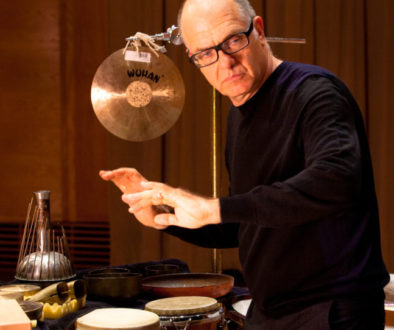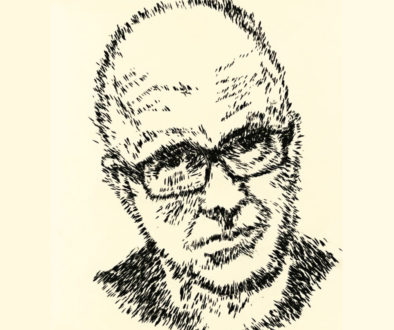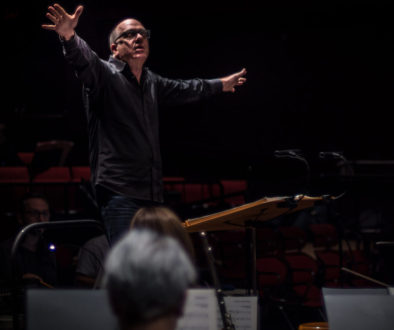Tough Assignment for an Accidental Conductor
By Steve Smith, The New York Times
Originally published September 2, 2011; full text and original article visible here.
“WELL before “Nine Rivers,” a major work by the Scottish avant-garde composer James Dillon, was given its premiere by the BBC Scottish Symphony Orchestra in Glasgow last November it had acquired a singular reputation. Interviewed in The Telegraph, a London newspaper, Mr. Dillon referred to his nine-part cycle as “the most canceled premiere ever.” Five previous attempts to mount it had been called off, casualties of its elaborate technical requirements, daunting difficulty and four-hour duration.
The sixth too almost derailed. Just a week before the concert, meant to commemorate Mr. Dillon’s 60th birthday, the conductor withdrew because of illness. Just when it seemed that all hope was lost, an unlikely savior emerged. Steven Schick, a virtuoso percussionist long associated with the New York composers’ collective Bang on a Can and a faculty member at the University of California, San Diego, where he directs the percussion ensemble Red Fish Blue Fish, volunteered to conduct the premiere.
Mr. Schick was no newcomer to Mr. Dillon’s music. In 2000 Mr. Schick had given the premiere of “La Coupure,” the hourlong solo piece for percussion and electronics that forms the midpoint of “Nine Rivers,” and was set to reprise the performance in Glasgow. His offer to conduct the entire piece was bold, even reckless, since he had been conducting only since 2006, when, as a neophyte, he made his podium debut as a guest of the La Jolla Symphony and Chorus, a community ensemble associated with the university.
Mr. Schick, 57, who became the La Jolla Symphony’s music director in 2007, laughed gently as he recalled the experience during a recent interview at a cafe in Morningside Heights.
“In the same way that I’d started conducting the orchestra,” he said, “I thought to myself: How hard could it be?”
Harder than he thought, he confessed. In the end Mr. Schick was engaged to conduct the four movements of “Nine Rivers” following “La Coupure,” with two other conductors overseeing earlier sections for chamber ensemble and chorus. Mr. Schick flew to London to consult with Mr. Dillon in advance of the concert and saw most of the scores for the first time then, in a hotel lobby. “Three days later I was standing in front of the BBC Scottish, working,” he said.
In a telephone interview Mr. Dillon described watching the rehearsals with what he likened to an anthropologist’s curiosity as the suspicious orchestra took Mr. Schick’s measure. “Within an hour and a half they were eating out of his hands,” Mr. Dillon said. “Musicians can smell other good musicians, and they just knew that he was basically a very good musician.”
On Sept. 14, 16 and 17 Mr. Schick, who called the critically hailed premiere “the most fantastic experience I hope never to repeat,” will plunge still deeper into Mr. Dillon’s magnum opus, conducting ICE, the International Contemporary Ensemble, and the Crossing, a Philadelphia chamber choir, in the American premiere of “Nine Rivers” at the Miller Theater. The event, jointly produced with Works & Process at the Guggenheim, divides the work across three evenings, largely to get around its need for two adjacent performance spaces, one to accommodate the elaborate staging of “La Coupure.”
The performances build on a fruitful bond between Mr. Schick and ICE, forged in a 2009 Xenakis concert at the Miller Theater and cemented in a triumphant collaboration in “Varèse: (R)evolution” at the 2010 Lincoln Center Festival. More work lies ahead: At the Kitchen in October, Mr. Schick will lead the ensemble in works Varèse created for jazz musicians in the 1950s. A Miller Theater portrait of the composer and trombonist George Lewis, Mr. Schick’s former San Diego colleague, will follow in November.
Claire Chase, ICE’s executive director and flutist, likened the group’s connection with Mr. Schick to a love affair.
“One of the many remarkable things about working with him is that he improves every rehearsal,” she said in an interview. “This not to say that he isn’t always insanely prepared. But unlike many conductors his preparation is never a barrier to the fluidity and democracy of ideas in a rehearsal. He’s always looking for new pathways into the music, and he’s also always open to having his mind changed.”
Mr. Schick’s influence continues to spread. Newly appointed the artistic director of the San Francisco Contemporary Music Players, he will supervise five fascinating programs of modernist staples and premieres for his inaugural season. Meanwhile, at the La Jolla Symphony, he will oversee a Stravinsky-based season, conducting “Le Sacre du Printemps” and “Les Noces” along with works by Mozart, Verdi and David Lang.
Mixing contemporary works and standard-repertory pieces was already part of the orchestra’s mission when he arrived, Mr. Schick said. Embracing that philosophy, he sprinkled uncompromising modern works, including premieres, throughout each of his seasons, to unfailing audience approval.
“I wonder if people realize in the typical symphony orchestra paradigm how anesthetizing it is to an audience to be given the explicit or inferred message that ‘you’re probably not up to this,’ ” Mr. Schick said. “If you say to somebody: ‘Look, we’re not doing this for a grant or because we feel we should. We do it because we love it and because you are our audience, you are the people we’d like to share this with’ — something as simple as a gesture of friendship like this, I’ve never seen people that don’t respond.”
What earned the fledgling conductor the role of music director, said Diane Salisbury, La Jolla Symphony’s executive director, was his knack for inspiring the performers.
“When you have a community orchestra, where people are volunteering their time and showing up every Monday night after a long day as a radiologist or oceanographer or whatever they’re doing, you need someone who can actually bring out the best work with that orchestra,” Ms. Salisbury said from San Diego. “By his inaugural concert, it was his orchestra.”
Mr. Schick’s swift rise to podium authority was even more remarkable for having been unplanned. An omnivorously intellectual, ceaselessly philosophical son of nonmusical Iowa farmers, he explained that for a contemporary percussionist coming of professional age in the early 1970s goal-oriented career planning was an alien notion. He laughed off a question about whether he aims for more prominent orchestras.
“I’m the one without a manager or Web site,” he said. “I’ve never had that. I’ve always either created or responded to fascinating musical ideas. And where I’ve ended up has been pretty interesting, so I’ll probably just keep doing that.
“But if the New York Philharmonic wants to talk,” he added after a pause, “I’m certainly happy to take their call.””


